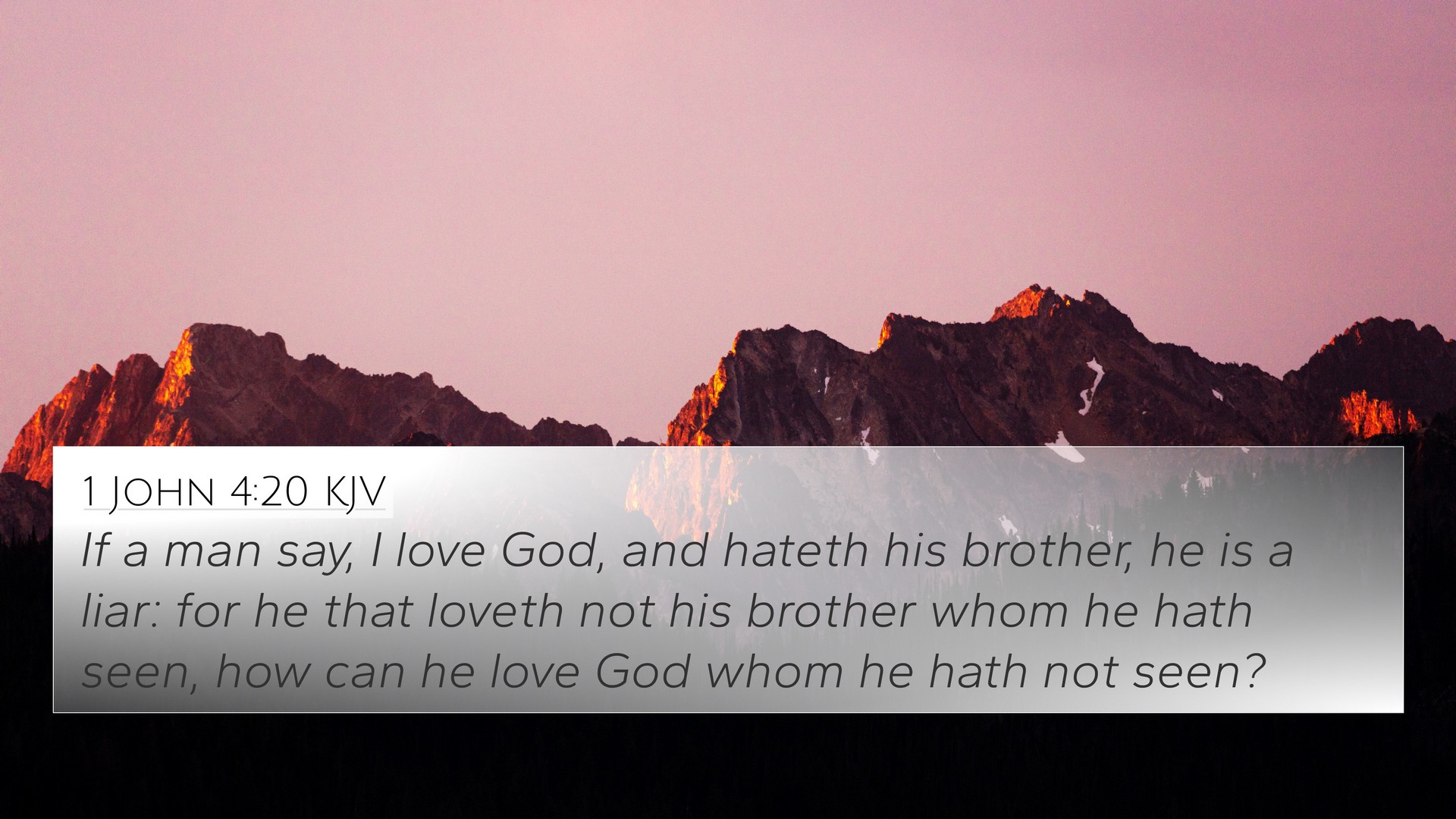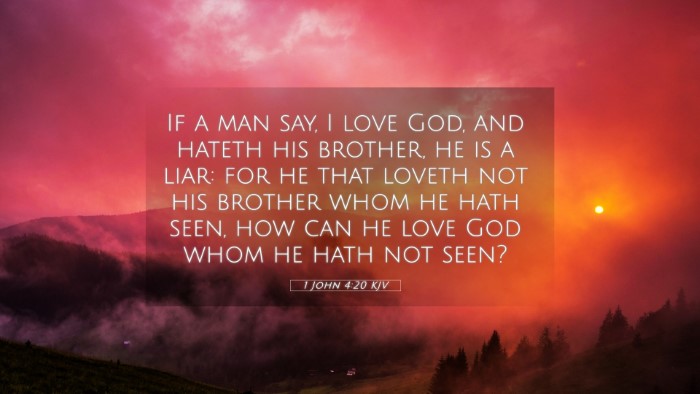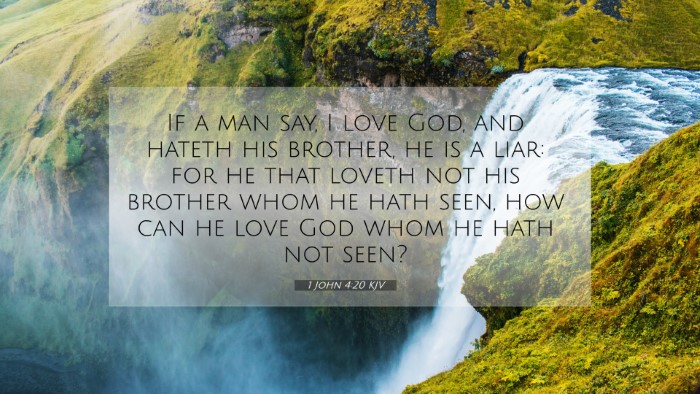Old Testament
Genesis Exodus Leviticus Numbers Deuteronomy Joshua Judges Ruth 1 Samuel 2 Samuel 1 Kings 2 Kings 1 Chronicles 2 Chronicles Ezra Nehemiah Esther Job Psalms Proverbs Ecclesiastes Song of Solomon Isaiah Jeremiah Lamentations Ezekiel Daniel Hosea Joel Amos Obadiah Jonah Micah Nahum Habakkuk Zephaniah Haggai Zechariah Malachi1 John 4:20 Similar Verses
1 John 4:20 Cross References
If a man say, I love God, and hateth his brother, he is a liar: for he that loveth not his brother whom he hath seen, how can he love God whom he hath not seen?
Uncover the Rich Themes and Topics of This Bible Verse
Listed below are the Bible themes associated with 1 John 4:20. We invite you to explore each theme to gain deeper insights into the Scriptures.
1 John 4:20 Cross Reference Verses
This section features a detailed cross-reference designed to enrich your understanding of the Scriptures. Below, you will find carefully selected verses that echo the themes and teachings related to 1 John 4:20 KJV. Click on any image to explore detailed analyses of related Bible verses and uncover deeper theological insights.

1 John 3:17 (KJV) »
But whoso hath this world's good, and seeth his brother have need, and shutteth up his bowels of compassion from him, how dwelleth the love of God in him?

1 John 2:9 (KJV) »
He that saith he is in the light, and hateth his brother, is in darkness even until now.

1 John 2:4 (KJV) »
He that saith, I know him, and keepeth not his commandments, is a liar, and the truth is not in him.

1 John 4:12 (KJV) »
No man hath seen God at any time. If we love one another, God dwelleth in us, and his love is perfected in us.
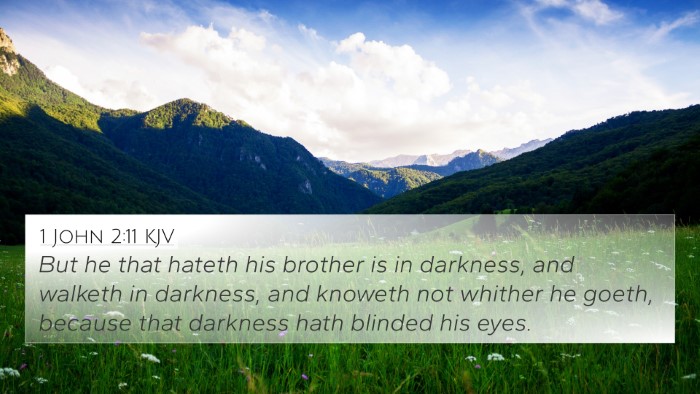
1 John 2:11 (KJV) »
But he that hateth his brother is in darkness, and walketh in darkness, and knoweth not whither he goeth, because that darkness hath blinded his eyes.
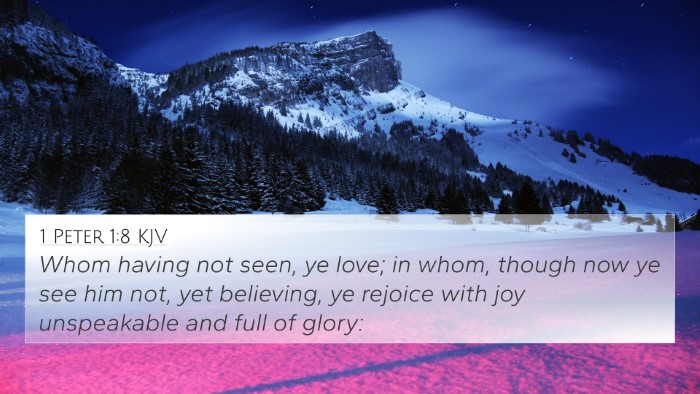
1 Peter 1:8 (KJV) »
Whom having not seen, ye love; in whom, though now ye see him not, yet believing, ye rejoice with joy unspeakable and full of glory:
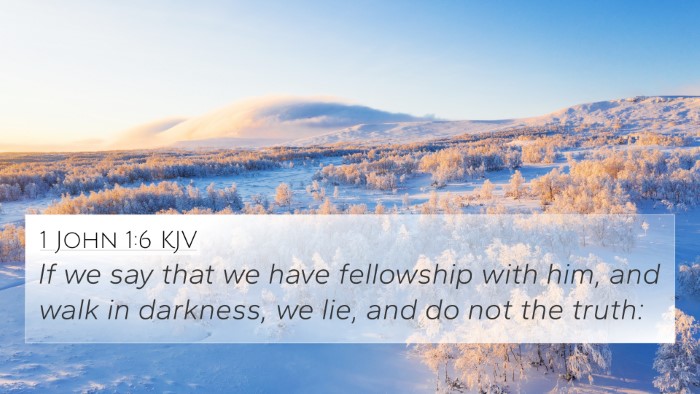
1 John 1:6 (KJV) »
If we say that we have fellowship with him, and walk in darkness, we lie, and do not the truth:
1 John 4:20 Verse Analysis and Similar Verses
Understanding 1 John 4:20
1 John 4:20 states: "If anyone says, 'I love God,' and hates his brother, he is a liar; for he who does not love his brother whom he has seen cannot love God whom he has not seen." This verse emphasizes the profound connection between our love for God and our love for one another. It reflects the theme of love as the foundation of Christian living, suggesting that true love for God must manifest in our relationships with others.
Commentary Insights
Matthew Henry's Commentary:
Matthew Henry explains that this verse serves as a test, pointing out the hypocrisy in claiming to love God while harboring hatred for others. He underscores that our visible relationships and actions toward those around us are a true reflection of our spiritual state. Henry relates love for God to obedience and argues that love for others is an integral part of our response to God's love for us.
Albert Barnes' Notes on the Bible:
Barnes emphasizes that the love of God requires action and is not merely a feeling or an abstract belief. He states that the claim of loving God without love for one’s brethren is fundamentally flawed. This verse cross-references with John 13:34-35 where Jesus commands us to love one another, establishing this as the hallmark of discipleship. Barnes highlights that genuine love originates from understanding God's love and grace towards us.
Adam Clarke's Commentary:
Clarke notes that the Apostle John speaks to a serious inconsistency that exists when individuals profess love for God while failing to demonstrate love for fellow humans. He emphasizes the necessity of seeing God through the lens of how we treat others. Clarke draws parallels to other scriptural teachings on love, such as in Matthew 5:23-24, encouraging believers to reconcile their relationships as a reflection of their relationship with God.
Major Themes
- The Nature of Love: The verse portrays love as an action that connects believers with God and each other.
- Hypocrisy in Faith: Claims of love for God are proven false without accompanying love for others.
- Visibility of Spirituality: Our relationships reflect our spiritual maturity and understanding of God's love.
Bible Cross-References
This verse connects to numerous other Biblical texts that reinforce its underlying message:
- Matthew 22:37-39: Jesus states the greatest commandment is to love God and the second is to love your neighbor as yourself.
- John 13:34-35: A new commandment to love one another serves as a sign of discipleship.
- 1 John 3:14: Assurance of salvation is linked to a genuine love for the brethren.
- James 2:8: The royal law is to love your neighbor as yourself.
- Romans 13:10: Love is the fulfilling of the law; it does no harm to a neighbor.
- Matthew 5:23-24: Urges reconciliation with a brother before offering gifts at the altar.
- 1 Corinthians 13:1-3: Brilliant acts and eloquent speech are meaningless without love.
- Colossians 3:14: Love binds all virtues together in perfect unity.
- Ephesians 4:32: Encourages kindness and forgiveness as reflections of God's love.
- Galatians 5:14: The whole law is fulfilled in one word: to love your neighbor as yourself.
Exploring Connections Between Bible Verses
1 John 4:20 invites readers to explore deeper into the connections between various scripture passages. By understanding how these verses relate, we gain insight into the overarching themes of love and relationships in the biblical narrative.
Inter-Biblical Dialogue
The dialogue between the Old and New Testaments creates a rich tapestry of love's significance throughout biblical history. This interplay can be explored through the following:
- Identifying Connections: The consistent theme of love found in Deuteronomy 6:5 and reiterated in the New Testament emphasizes love for God and neighbor.
- Comparative Studies: Analyzing how love is presented in the Gospels compared to the Epistles highlights a cohesive scriptural message.
- Linking Proverbs with New Testament Teachings: Wisdom literature often connects with New Testament concepts, illustrating practical applications of love.
Tools for Bible Cross-Referencing
Utilizing various resources can enhance one's study of scripture, facilitating a deeper understanding of inter-Biblical connections. Some highly recommended tools include:
- Bible Concordance: A comprehensive tool for locating scripture references and their corresponding themes.
- Bible Cross-Reference Guide: Essential for exploring thematic connections and understanding how verses support one another.
- Cross-Reference Bible Study: Techniques for utilizing cross-references effectively in personal and group study settings.
Conclusion
In summary, 1 John 4:20 brings to light the essential relationship between our love for God and the necessity of loving our fellow human beings. Through thoughtful commentary and cross-referencing, believers can better appreciate the interconnectedness of scripture and the clear call to embody love in all our interactions. It is through these practices that we can deepen our faith and live out the truth of God’s word in our daily lives.
